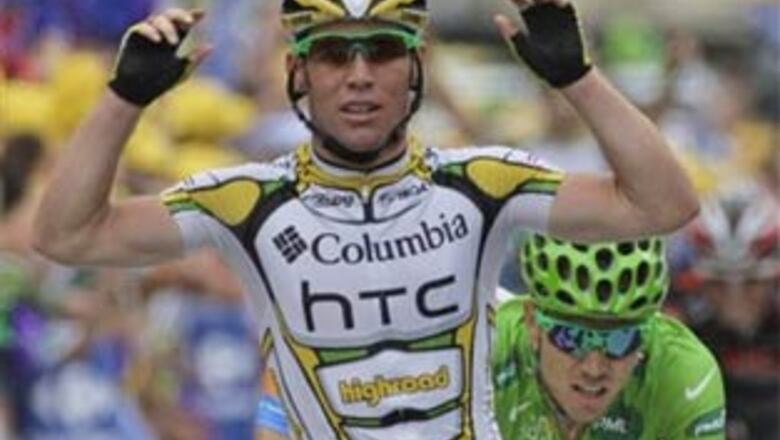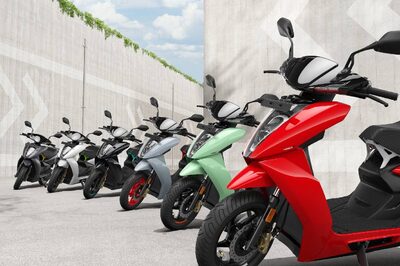
views
Issoudun (France): After taunting his rival and teammate Alberto Contador for more than a week, Lance Armstrong may have realised that too much rivalry could ruin his quest for an eighth Tour de France win.
The battle between the Spaniard and the seven-time Tour winner — who trails his younger Astana teammate by only two seconds overall — has been the talk of the Tour so far.
Their fight has featured on the roads and in newspapers, but Tuesday it was time for a time-out, on a day when Contador and Armstrong held their second and third spots in the overall standings behind race leader Rinaldo Nocentini of Italy. Britain's Mark Cavendish won the 10th stage, ridden without earpieces.
"In the first week, the media are looking for stories to write," Armstrong said. "They analyse every little thing, they say: 'They hate each other'. It's not the case."
The 37-year-old Armstrong doesn't hide his goal to win another Tour while Contador, whose legs are 11 years fresher than Armstrong's, is craving for a second victory in the most prestigious three-week race in the world.
"The biggest tragedy would be that if we both want it so badly that someone else gets it," Armstrong said, two days after admitting that "tensions" existed in the Astana camp.
The Armstrong-Contador rivalry turned into animosity last week in the Pyrenees, where the Spaniard launched an attack on his way to the Andorran ski resort of Arcalis to leapfrog Armstrong overall. After that stage, Armstrong hinted that Contador was riding against the team strategy.
But Armstrong tried to minimise the ill-feeling within his team, explaining Tuesday that clashes were natural between the two greatest champions cycling has known for the last 10 years, given their respective ambition.
"There's a little bit of friction, of tension. We both want to win the Tour," Armstrong said.
The Texan perfectly knows how important is the unity of a team in a bid to win the Tour.
During his seven-year dominant spell on the race between 1999 and 2005, Armstrong always had the strongest team of the field to support him.
With four riders in this year's Tour Top 10 — Contador, Armstrong, Andreas Kloeden and Levi Leipheimer — Astana is arguably the best team, but an internal rift between the pro-Armstrong and the pro-Contador factions could lead the Kazakh-funded squad to a failure.
Contador is likely to leave the Astana team at the end of the season while Armstrong, back to competition after 3 1/2 years of retirement, has expressed a wish to ride another year. It seems improbable to see them in the same squad next year but it's crucial for Astana to maintain its unity as long as possible.
PAGE_BREAK
The settling of old scores will inevitably happen and has been scheduled in the mountains. Until Friday's treacherous stage between Vittel and Colmar — a prelude to Sunday's first Alpine stage — Contador and Armstrong are likely to sit back in the peloton, leaving the headlines to the sprinters and their king, Mark Cavendish.
Last year, Cavendish won four stages but did not finish the race. He has now won seven stages in his Tour de France career and his main goal is to earn the best sprinter's green jersey.
"The green jersey is always sitting on the back of our minds," said Cavendish's Columbia teammate Mark Renshaw. "If 'Cav' does win four stages then it's very likely that he is going to have the lead in the green jersey and of course it's an objective to get to Paris with that."
Nocentini finished 34th on Tuesday while Contador was 40th and Armstrong 46th on the route from Limoges to Issoudun. Nocentini stayed six seconds ahead of Contador.
Cavendish's victory was overshadowed by the controversy surrounding Tour organizers' decision to ban earpieces during the stage.
Riders were stripped of their customary earpieces, left to fend for themselves and denied contact with their teams during the 194.5-kilometer (121-mile) route. The decision to ban rider radios and TV sets in cars was made last month.
Earpieces allow riders to be linked to their directors in team cars. Riders can be informed of developments and told when they need to attack or chase rivals in a breakaway.
The strategy was popularized by Armstrong when he won his first Tour in 1999. Some riders and former champions say the tactic makes cycling too robotic.
The Tour wanted to inject drama into the race by eliminating earpieces for the 10th and 13th stages. Many riders — Armstrong, Contador and Nocentini — were far from pleased with the experiment.
"The fact is for us it's dangerous not to have them," Nocentini said. "There are dangers on the road."
Instead of drama, the Tour got a day of boring slow riding. The only excitement came with Cavendish's dash a few hundred meters from the finish for his third stage victory in this race.
"The reason to have no radios was to have more attractive racing, and that's obviously not what happened," Astana team director Johan Bruyneel said. "I think if that's what they wanted to accomplish, it's been a failure. I just think it's a bad idea to go back 20 years and do something like this, stupidly, in the biggest race of the year."
Wednesday's ride covers 192 kilometers (119 miles) from Vatan to Saint-Fargeau and again favors sprinters. Another earpiece-free stage is scheduled on Friday, a tricky course featuring one big climb and possibly many attacks.




















Comments
0 comment